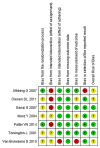The development of laparoscopic skills using virtual reality simulations: A systematic review
- PMID: 34138901
- PMCID: PMC8211221
- DOI: 10.1371/journal.pone.0252609
The development of laparoscopic skills using virtual reality simulations: A systematic review
Abstract
Background: Teaching based on virtual reality simulators in medicine has expanded in recent years due to the limitations of more traditional methods, especially for surgical procedures such as laparoscopy.
Purpose of review: To analyze the effects of using virtual reality simulations on the development of laparoscopic skills in medical students and physicians.
Data sources: The literature screening was done in April 2020 through Medline (PubMed), EMBASE and Database of the National Institute of Health.
Eligibility criteria: Randomized clinical trials that subjected medical students and physicians to training in laparoscopic skills in virtual reality simulators.
Study appraisal: Paired reviewers independently identified 1529 articles and included 7 trials that met the eligibility criteria.
Findings: In all studies, participants that trained in virtual simulators showed improvements in laparoscopic skills, although the articles that also had a physical model training group did not show better performance of one model compared to the other.
Limitations: No article beyond 2015 met the eligibility criteria, and the analyzed simulators have different versions and models, which might impact the results.
Conclusion: Virtual reality simulators are useful educational tools, but do not show proven significant advantages over traditional models. The lack of standardization and a scarcity of articles makes comparative analysis between simulators difficult, requiring more research in the area, according to the model suggested in this review.
Systematic review registration number: Registered by the Prospective Register of Systematic Reviews (PROSPERO), identification code CRD42020176479.
Conflict of interest statement
The authors have declared that no competing interests exist.
References
-
- Charlier N, Zupancic N, Fieuws S, Denhaerynck K, Zaman B, Moons P. Serious games for improving knowledge and self-management in young people with chronic conditions: a systematic review and meta-analysis [published correction appears in J Am Med Inform Assoc. 2018. Sep 1;25(9):1270–1271]. J Am Med Inform Assoc. 2016;23(1):230–239. doi: 10.1093/jamia/ocy063 - DOI - PMC - PubMed
Publication types
MeSH terms
LinkOut - more resources
Full Text Sources
Research Materials
Miscellaneous




